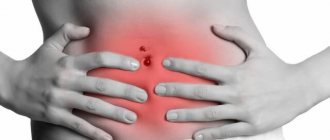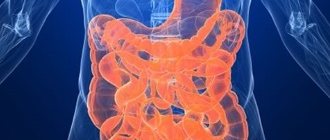Why might hunger pains occur?
The causes of this condition are usually pathologies of the digestive system. If the entrance or cardinal section of the stomach is affected, the sensation of discomfort intensifies on the left side of the sternum. In these cases, the person usually wants to eat. In this case, it is enough to take a small portion of food: a piece of bread, a cracker or candy. This way hunger pains usually go away quickly. The symptoms accompanying this condition do not always clearly define the clinical picture of the pathology that provoked it. An objective assessment of the disease is given if other signs are present. It should be said that discomfort or pain can occur not only when the stomach itself is affected. When assessing the condition, it is necessary to take into account the presence of other manifestations: heartburn, vomiting, nausea, diarrhea, bloating.
What can you do if your hunger increases?
Increased hunger with mild pain at night may be associated with hormonal balance. Very often the body, on a biological level, confuses day and night. In this regard, a person’s appetite worsens or disappears during the day, and insomnia appears at night. If you went to bed earlier than expected, then at night you will wake up from an obsessive feeling in your stomach and it will not stop until it receives a portion of food. In this case, the feeling of hunger appears due to a hormonal background.
Sometimes you don't have the opportunity to have lunch during the day or you deliberately suppress your hunger, which will definitely lead to a strong feeling of hunger after eight in the evening.
In addition, pain during hunger may be due to disturbances in the secretion of gastric juice, and may be psychological in nature. In most cases, the doctor recommends consulting a psychologist, since pain and hunger at night may appear due to depression or daytime overexertion. In this case, food plays the role of a sedative, which in the future will lead to another problem - obesity.
You need to get rid of hunger at night. With the first night sensations, it is important to follow a diet. You will have to confront not only your habits and weaknesses, but also fight your entire body, and this is not so easy to do. Your body will definitely express its protest against such innovations, which may manifest itself in the form of increased pain.
Sometimes it is simply impossible to endure hunger pains!
Alternative (traditional) medicine can offer many plants that have a beneficial effect on the nervous system and the entire body as a whole. Such medicinal herbs include St. John's wort, lemon balm, and chamomile. They are inexpensive and sold at any pharmacy kiosk.
Hunger pain can be dealt with through exercise. An excellent medicine is morning exercises, during which calories are burned, which means that they are correct and a healthy appetite will definitely appear by lunchtime.
Another effective way to combat hunger is to consume vitamins, a full complex of all macro and microelements that stabilize your metabolism. If you notice that you have extra pounds due to late-night snacking, it’s time for active action, as violations have made their presence known.
You can get rid of obsessive hungry stomach pains like this:
- analyze the nature and symptoms of pain;
- do not delay visiting doctors: psychologist, nutritionist and gastroenterologist;
- timely treatment.
Causes of pain and rumbling in the abdomen, interesting research on this issue:
Do you know that sinking feeling of anxiety? Everything seems to be normal, but the person cannot calm down in any way and experiences feelings of anxiety, excitement and fear. “Sucks in the pit of the stomach” - this is how they often say about the onset of the condition. Why does it “suck”, and where is this “spoon”? The “spoon” has long been called the xiphoid process of the sternum, located above the stomach. You can easily feel it at the bottom of the sternum, and it really looks like a spoon. When a person is faced with thrills, danger, is nervous or frightened, the body produces stress hormones, under the influence of which the nerve endings located in the stomach are excited. This feeling, caused by nervous experiences, is called “sucking in the pit of the stomach.” But this expression also has an anatomical meaning. A feeling of feeling in the pit of the stomach is the main criterion for feeling hungry. It’s more likely not hunger itself, but a feeling of emptiness in the stomach. Most likely, our stomach got used to a full state, and then unloaded. With his spasms he reminds of his desire to eat: to fill up and begin his work again. An aching, nagging pain in the pit of the stomach, especially after eating, is also one of the main signs of gastritis. Oddly enough, gastritis is very often observed in school-age children. Why? After all, it seems that homemade food cannot cause this disease. In addition, almost all children are provided with healthy food in school canteens. But, nevertheless, gastritis is becoming a disease of young people. About twenty-five years ago, microbiologists made a discovery: the occurrence of gastritis is provoked by the bacteria Helicobacter pylori. These bacteria have been known for a very long time, but they were safe for humans. Now, when due to the environmental situation, unhealthy food with all kinds of additives, the resistance of the human body has sharply decreased, these bacteria can cause harm to humanity. The first infection with Helicobacter pylori bacteria occurs from parents in the family. Through kissing, unwashed hands, and sharing utensils, a four-year-old child can become infected and become a carrier of these bacteria. There are no external signs yet, everything is still good, but changes in the gastric mucosa are already beginning to occur. In one “beautiful” moment, everything comes out! Abdominal pain, disorders... Great emotional stress at school, poor nutrition, when lunch is replaced with chips and crackers, and compote with soda, contribute to the appearance of gastritis. When should parents sound the alarm to avoid further development of this disease? The first signs of gastritis are: - belching and bad breath; - loss of appetite; — there is a feeling that it’s sucking in the pit of your stomach. If pain in the upper abdomen appears after eating spicy and sour foods or drinking coffee, then a diagnosis of “gastritis” is possible. It can also occur due to emotional stress. If these pains are not severe, passing within literally 10 minutes, then there is no need to panic. First of all, you just need to provide the child with first aid: give him more milk and dairy products, reduce the amount of carbohydrates. And what’s also important is to divide your daily meals into 5-6 times. Although you shouldn’t delay your visit to the doctor! In case of severe acute or dull abdominal pain, possible vomiting and chest pain along the esophagus, vomiting mixed with blood, you should immediately contact a gastroenterologist or call an ambulance. To reduce pain, you can apply a warm heating pad to your stomach, drink weak, not too hot tea or water. Treatment of gastritis is not very long, with strict adherence to all recommendations of the attending physician - up to 2 weeks. A sucking sensation in the pit of the stomach may be felt if the pancreas is affected. It regulates various processes in the human body, including the blood supply to the gastric mucosa. As soon as you “tease” it with constant overwork and malnutrition, it immediately worsens blood circulation, and erosive gastritis begins. It is possible to cure gastritis with the help of medications, but it is much more difficult to remove the causes of the disease. And for this you need to get enough sleep, reduce psycho-emotional stress, limit computer games that excite children, and eat regularly and properly. To strengthen the nervous system - the link between the brain and the pancreas - it is useful to take a contrast shower and rubbing. And, of course, constantly see a doctor.
The influence of nutrition on the activity of the gastrointestinal tract
Experts note that the more pronounced the pathological process itself becomes, the stronger the hunger pain in the stomach. However, for example, with prolonged chronic gastritis, the discomfort may not be very intense. However, such sensations are the first signal to visit a doctor. Diet is considered one of the main components of therapeutic measures for gastrointestinal disorders. If hunger pain in the stomach occurs regularly, it is necessary to limit the intake of foods that can worsen it. As a rule, it is recommended to avoid fatty, salty, and spicy foods. It is advisable to add vegetables and fruits to your diet. A nutritionist will tell you in more detail about which foods you can eat and which you can’t.
Pain as a sign of illness
In case of psycho-emotional overstrain, severe stress or danger, the autonomic nervous system is overexcited, which leads to an increase in muscle activity of this process. This condition is called migrating motor complex (MCC).
This is a completely normal phenomenon that is not considered a pathology and should not cause any concern. The appearance of a sucking pain in the stomach area, which disappears on its own within 5-10 minutes, is the norm and does not require medical intervention.
But these are not all the causes of sucking pain in the stomach. In some cases, painful spasms can be triggered by the following factors:
- Gastritis, especially its erosive form;
- Peptic ulcer of the stomach or duodenum.
- Duodenitis, gastroduodenitis.
- Pathologies of the pancreas.
Sucking pain in the stomach can also be caused by aggressive exposure to harmful chemicals, as well as prolonged use of certain medications.
In some cases, the appearance of unpleasant, painful sensations in the stomach area can be caused by hormonal imbalances in the body.
What does hungry stomach pain at night mean?
The intensity of sensations may vary depending on the time of day. If hunger, for example, increases at night and is accompanied by pain, then this may be due to a hormonal imbalance, namely a change in the concentration of leptin or melatonin. In many cases, during the day a person does not have a special desire to snack or has no appetite at all. Often the night-day rhythm in the body is disrupted. Discomfort at night for many people is accompanied by insomnia. If a person goes to bed early, he will definitely wake up with a feeling of hunger, an unpleasant tugging feeling in the stomach. The condition goes away if you eat something.
Symptoms of the disease
Depending on the cause of pain in the stomach, symptoms can vary significantly.
- The pain lasts 5-10 minutes and disappears on its own - the need to eat.
- Painful sensations last from 10 minutes to an hour - most often this is how nervous strain or stress manifests itself.
- If cramps and discomfort occur 4-6 hours after eating, this is a common sign of gastritis or peptic ulcer disease.
- Unpleasant sucking sensations at night most often indicate a hormonal imbalance in the body.
The initial stages of gastritis and gastric ulcers, in addition to painful spasms, are often accompanied by symptoms such as loss of appetite, flatulence, belching with a bitter or sour taste, in some cases vomiting, and the appearance of sharp pain after eating smoked, pickled, salty, fatty, fried foods.
Other conditions that cause discomfort
In some cases, a person deliberately suppresses hunger during the day. Subsequently, this leads to disturbances in the gastrointestinal tract, which are manifested by a strong desire to eat after eight or nine in the evening. At night, hunger accompanied by pain may also indicate disturbances in the secretion of gastric juice and be based on psychological disorders. In these cases, the doctor may recommend visiting a psychologist. Hungry stomach pain at night is sometimes a consequence of depression and overexertion. For many people in this state, food is a kind of sedative. Such disorganized eating can lead to obesity.
Feeling of a lump in the stomach
Gastritis
33364 21 August
IMPORTANT!
The information in this section cannot be used for self-diagnosis and self-treatment.
In case of pain or other exacerbation of the disease, diagnostic tests should be prescribed only by the attending physician. To make a diagnosis and properly prescribe treatment, you should contact your doctor. Feeling of a lump in the stomach: causes of occurrence, what diseases it occurs with, diagnosis and treatment methods.
The feeling of a coma in the stomach is described when one experiences a feeling of heaviness, discomfort and fullness in the stomach, even when it is only slightly filled. Sometimes patients find it difficult to determine the exact location of the coma and point to the lower third of the sternum or solar plexus. In some cases, a feeling of a lump and cramps in the stomach may occur on an empty stomach.
Types of feeling of a coma in the stomach
A feeling of heaviness or coma in the stomach can be an independent symptom, but may be accompanied by other unpleasant sensations. Sometimes it is heartburn, sour belching, bloating, constipation.
In some cases, a feeling of a lump appears when swallowing
, making it difficult for chewed food to pass through.
In addition, patients may complain that food did not enter the stomach, but stopped in the esophagus.
In such patients, vomiting of unchanged food is possible. When describing symptoms, you should pay attention to the time of onset of discomfort - before
or
after eating
.
The patient may feel heaviness in the stomach with pain or heartburn, on an empty stomach or after eating, and night pain also occurs.
Sometimes the sensation of a lump in the stomach occurs
regardless of food intake
.
In such cases, they complain of stomach spasms
, sometimes accompanied by a feeling of a lump in the throat.
What diseases cause a sensation of a lump in the stomach?
Eating more than your usual amount of food
, accompanied by a feeling of fullness and heaviness in the stomach. This condition is not a manifestation of the disease and goes away on its own after some time.
It should be noted that stomach capacity varies depending on eating habits.
People who are small or
have undergone gastric resection
can eat a small portion, otherwise they will not only experience a feeling of heaviness or fullness in the stomach, but also vomiting.
A sensation of coma may occur when consuming foods that cause excess gas.
, as well as
food that is difficult to digest
(salads with mayonnaise, fatty, fried and smoked dishes) and
highly carbonated drinks
.
When eating dry and hastily,
an unpleasant sensation in the epigastric region is caused by poor processing of the food bolus with saliva and insufficient secretion of gastric juice.
However, a feeling of coma or discomfort in the stomach, or more precisely, in the epigastric region, may appear after eating even a small amount of food
.
This condition can be caused by diseases of the gastrointestinal tract or other reasons.
First of all, they assume indigestion, or functional dyspepsia. Its symptoms most often include pain and discomfort immediately after eating, a feeling of heaviness and fullness in the stomach, heartburn, belching, nausea, sometimes vomiting, reflux of stomach contents into the esophagus, bloating and bowel dysfunction.
Dyspepsia can be a symptom of both functional disorders of the gastrointestinal tract and organic diseases.
Functional causes of dyspepsia are often caused by errors in diet and medications.
Iron ions have an irritating effect on the gastric mucosa, which is most pronounced when taking medications based on ferrous iron. Nonsteroidal anti-inflammatory drugs, which are systematically taken for rheumatic and non-rheumatic diseases of the musculoskeletal system, also cause undesirable effects: heaviness and discomfort in the stomach, nausea, vomiting, and dyspeptic disorders.
Neurological disorders
(neuroses, depression), psychological trauma almost always affects the state of the gastrointestinal tract, leading to impaired motility.
Functional dyspepsia is not accompanied by erosive or ulcerative lesions of the stomach; its symptoms disappear when the general state of health is normalized.
One of the common causes of discomfort in the stomach immediately after eating is
gastritis
. It is accompanied by functional and inflammatory processes that have a negative effect on the gastric mucosa. Symptoms of gastritis include heaviness and pain in the stomach, indigestion, nausea, heartburn, sour belching and bloating when eating any food. The inflammatory process leads to atrophy of the mucous membrane and disruption of the glands that secrete gastric juice.
Insufficient gastric juice and weak peristalsis of the stomach and intestines make it difficult to digest food.
Gastritis is often accompanied by dyspepsia. In addition to a feeling of heaviness and aching pain in the epigastric region after eating, poor appetite, weakness, fatigue, and irritability are noted. When pressing on the abdomen, a dull pain appears in the projection of the stomach.
Impaired motor-evacuation functions
upper digestive tract is always accompanied by a feeling of coma or a feeling of heaviness in the stomach. Disorders of esophageal motility are usually caused by incoordination of the esophageal sphincters. Uncoordinated work of the esophageal muscles can lead to a delay in the bolus of food on the way to the stomach, the reflux of food particles into the respiratory tract, and reflux (return of stomach contents into the esophagus). Impaired gastric motility leads to slow emptying, which is accompanied by a feeling of heaviness and fullness even with a small amount of food consumed, pain in the epigastric region, heartburn, nausea and vomiting.
Motility disorders of the esophagus and stomach may be associated with gastroesophageal reflux disease, gastritis, tumors and stenoses (narrowings), metabolic disorders (hyperkalemia, hypercalcemia), postoperative complications of gastrectomy, taking certain medications (opiates, antidepressants, hormones), alcohol and nicotine .
Peristalsis worsens with a sedentary lifestyle and with age.
Stomach cancer can also cause symptoms such as a feeling of heaviness or a lump in the stomach. Moreover, depending on the location of the tumor, its manifestations vary. If the tumor is located closer to the esophagus, problems with swallowing food occur. This is accompanied by increased salivation, nausea, vomiting, and pain in the epigastric region. When the tumor is localized in the lower parts of the stomach, closer to the duodenum, a prolonged feeling of heaviness after eating and bloating is characteristic. When burping, a putrid odor may be felt.
Which doctors should you contact if you feel a lump in your stomach?
If there is a constant feeling of a lump in the stomach or a feeling of heaviness, it is necessary to contact or to make a preliminary diagnosis. The gastroenterologist may also refer the patient to an oncologist. A consultation may also be required.
Diagnosis and examination if you feel a lump in the stomach
First of all, clinical blood and stool tests are necessary for differential diagnosis.
What to do if discomfort occurs?
Useful article? Share the link on VKontakte
Experts strongly recommend getting rid of night hunger. First of all, you need to adjust your diet. In this case, you will have to fight not only with weaknesses, but also correct the habits of the whole organism. Often, a change in diet is accompanied by increased pain. In these cases, you can use traditional medicine recipes. For example, infusions of chamomile, lemon balm, and St. John's wort have a beneficial, calming effect on the digestive system (and on the entire body in general). Experts also recommend playing sports and moving more. When burning calories, appetite appears after a few hours or even earlier. It is recommended to do exercises in the morning; a light jog will not hurt. A healthy desire to eat will begin to appear just in time for lunch. Doctors recommend taking additional vitamins: complete complexes of micro- and macroelements help stabilize metabolic processes. All these measures should be carried out at the initial stages of the manifestation of the pathological condition. However, if there is a significant increase in body weight due to night meals, you should consult a specialist.
Diagnostics
In women, a sucking feeling in the stomach appears due to hormonal changes during pregnancy.
If you often suck in your stomach for no apparent reason, you should consult a doctor and undergo an examination. Diseases detected at the initial stage of development are eliminated faster and easier than advanced pathologies. The following methods are used to make a diagnosis:
- Anamnesis collection. The doctor analyzes the existing complaints, their nature and frequency of occurrence.
- Clinical blood test. Indicates the presence and degree of inflammation in the body.
- Fibrogastroscopy. Reveals the condition of the stomach walls, the presence of an inflammatory or erosive process, ulcers.
- Probing and analysis of gastric juice. It is used when it is necessary to determine the acidity and characteristics of the enzymes of an organ.
Treatment
Many people, even noticing disturbances in the functioning of the digestive system, deliberately ignore the manifestations and are in no hurry to visit a doctor. Meanwhile, hunger pain (especially after eating) may indicate the presence of an ulcer. If you do not seek help from a doctor in a timely manner, violations can lead to serious consequences. You should not bring your body to a state where surgical intervention is required. As already mentioned, pain can be a consequence of stressful situations. In this regard, it is recommended to protect yourself from emotional overload. Experts insist that therapeutic measures are taken seriously. Particular attention must be paid to diet. There are special diets that help normalize the activity of the gastrointestinal tract. If you consult a doctor in a timely manner, you can avoid medication and, in many cases, surgical intervention. The neglect of the disease can lead to the need to completely give up your favorite food.
Most of us often ignore discomfort such as hunger pain in the stomach. It’s understandable why, because after eating something tasty, a sandwich or a cookie, the unpleasant and obsessive feeling is drowned out.
However, hunger pain is a symptom that signals that you are developing or already progressing a disease of the gastrointestinal tract (gastritis, duodenal and stomach ulcers).
What treatment is prescribed?
Medicines
The action of antibiotics is aimed at the causative agent of the disease.
If a serious disease is detected, the sucking stomach is treated with medications. The doctor selects the course of therapy individually, based on the results of the examination. To restore the gastric mucosa, gastroprotectors are prescribed. In the presence of erosions and ulcers, special antiulcer agents are used. In addition, they use:
- antispasmodics;
- antacids;
- antibiotics;
- enzymes;
- antiemetic drugs.
Diet and lifestyle
If there is gastritis or an ulcer, the patient is prescribed dietary nutrition. Table No. 1 involves avoiding irritating foods such as spices, smoked meats, and coarse vegetables. Food should not be fried, and ready-made dishes are crushed using a blender before consumption. In the absence of gastrointestinal pathologies, it is important not to take long breaks between meals in order to prevent the development of gastritis and a feeling of sucking in the stomach. To treat and prevent disorders in the gastrointestinal tract, you should give up bad habits. It is recommended to lead an active lifestyle and often be outdoors. To avoid sickness in the stomach, you should avoid stress.
Hunger pains and their signs
Hunger pains can be very intense
Hunger pain is called a pre-ulcerative condition, which manifests itself in the presence of advanced inflammation of the stomach or in the presence of erosive duodenitis (intestinal disease).
Painful sensations occur in the pit of the stomach or slightly lower, the pain intensifies when pressing with your fingers.
Additional symptoms of a peptic ulcer: nausea, sour vomiting that occurs at the peak of pain, heartburn and even constipation. A fairly common reaction to hunger pain is loss of appetite. This is usually a psychological problem; the body rejects food because it is too heavy for it.
More about gastritis
The cause of gastritis is the Helicobacter pylori bacterium, which is infected through household means due to failure to comply with basic hygiene rules. Also contributing to the development of symptoms is irregular eating, junk food - chips, sweet carbonated water, crackers - instead of a full lunch.
Symptoms of gastritis
The first signs of illness in young people are:
- poor appetite;
- sour belching;
- unpleasant odor when breathing;
- painful sucking sensations after spicy, sour, fried, fatty foods.
The above symptoms should alert you and become a reason to consult a doctor for further treatment. In order to prevent the disease from developing, it is necessary to balance the diet and adjust the diet.
If severe symptoms appear - acute pain, vomiting with bloody elements - you should call emergency help. Before she arrives, you can relieve the pain by placing a heating pad with warm water on your stomach. Consultation with a gastroenterologist is required.
The therapeutic course is prescribed by a gastroenterologist. The duration of the course takes no more than 10–14 days.
An integrated approach to treatment involves the use of drugs that relieve inflammatory processes and the establishment of a nutritious, balanced diet with frequent small meals.
Strengthening the state of the central nervous system, staying in the fresh air, and physical activity also have a beneficial effect on accelerating recovery from the disease.
You should not self-medicate; it leads to aggravation of pathological manifestations and delays the healing process.
Folk remedies
Traditional medicine has accumulated considerable experience in overcoming discomfort in the stomach. The use of infusions of St. John's wort flowers, plantain leaves, and mint has a positive effect. The effect of flaxseed on the walls of the stomach is beneficial. It’s easy to prepare infusions: 1–2 tbsp. l. crushed plants or seeds are poured into a glass of boiling water, infused for 2-3 hours and taken warm during the day.
But no matter how good the folk advice is, they can only be used in consultation with the attending physician. You can relieve pain for a while at home, but only qualified specialists can identify and eliminate the cause of its occurrence.
Timely consultation with a doctor will help prevent the development of a serious pathological disease masked under such a simple symptom as a sucking sensation in the pit of the stomach.
Many people have encountered this problem when their stomach sucks. One of the common reasons is hunger. To get rid of the problem, it is enough to eat normally. But what to do if sucking pain in the stomach occurs constantly? You need to urgently contact a specialist and undergo a thorough examination.
Hunger pains, what to do?
The first thing that needs to be done is to analyze the pain, make an appointment with a gastroenterologist, undergo diagnostics, and possibly even a second one. After which the doctor will make a decision - hospitalization.
You can analyze pain sensations as follows: with a stomach ulcer, pain appears approximately half an hour after eating; for duodenal ulcer - after a few hours. These symptoms may appear at night.
If you are experiencing hunger pangs, you must control your diet. Eliminate spicy, fatty and fried foods from your daily diet. Replace a sandwich snack with hot food: soups, cereals. Fish and meat are boiled or steamed. If you have hunger pains, you should give up all kinds of weight loss diets.
Why does it suck in the stomach?
Prolonged fasting is accompanied by sucking sensations that arise due to the aggressive effect of hydrochloric acid on the walls of the stomach. This can lead to pathological changes in the mucous membrane and the formation of erosions and ulcers.
If unpleasant sensations occur constantly, often nausea, pain and belching, this indicates gastritis. Inflammation of the mucous membrane disrupts the acid balance of the organ. The affected walls react sharply to the action of gastric juice, so it seems that there is a sucking sensation in the stomach. At the initial stage of the disease, the symptom may be mistaken for a feeling of hunger.
Depending on the characteristics of the manifestation and additional symptoms, a sucking feeling can be considered a sign of an ulcer. Stomach pathology appears 30 minutes after eating, and with intestinal disease, the stomach begins to suck a few hours after eating. The ulcerative process is characterized by the occurrence of unpleasant sensations at night. In addition, there may be pain, heartburn, and stool disturbances.
A sucking feeling in the pit of the stomach occurs during times of stress, since the gastrointestinal tract is closely connected with the central nervous system. Any emotional fluctuation can provoke changes in the functioning of the stomach and intestines. During nervous tension, stress hormones are released, under the influence of which the nerve endings in the stomach are excited. For this reason, abdominal pain is more common in young people, as they are more susceptible to mood swings.
A sucking pain in the stomach may signal the need to eat. The opinion that this is a safe cause of discomfort is erroneous. If the stomach, ready for work, does not receive food on time, its enzymes begin to break down its own mucous membrane. As a result, an inflammatory process develops that can be aggravated by the formation of erosion or ulcers.
Hunger pains - the reasons for their occurrence
Hunger pain is a signal of stomach problems
Symptoms of stomach and duodenal ulcers, for example, hunger pains, loss of appetite, can appear with diseases such as fascioliasis, clonorchiasis, strongyloidiasis and opisthorchiasis. However, with these ailments, pain sensations are less pronounced daily.
With liver trematodes, hunger pains are accompanied by dull, periodic pain in the right hypochondrium area, radiating to the shoulder. The pain intensifies with physical activity.
With prolonged opisthorchis invasion, violations of the integrity of the bile ducts can be detected, which can lead to bile-purulent peritonitis. All complications and further development of the disease can be prevented only by drug treatment of opisthorchiasis directly in the foci.
Infestation by helminths: pinworms, roundworms, whipworms, in addition to the above symptoms, can initiate appendicitis and appendiceal colic. At an early stage of development of the disease, allergic hepatitis may appear.
When sucking pain and burning in the stomach is caused by a stomach ulcer
Sucking and burning in the abdomen are a clear symptom of a stomach or duodenal ulcer. Peptic ulcer is a limited defect of the mucous membrane with inflammatory infiltration. Its formation is most often associated with infection by the bacterium Helicobacter Pylori, which produces toxins that actively damage mucous cells. Over time, this develops into gastritis and leads to ulceration.
» data-medium-file=»https://i1.wp.com/medcentr-diana-spb.ru/wp-content/uploads/2020/02/Helicobacter-Pylori.jpg?fit=396%2C300&ssl=1? v=1582619409″ data-large-file=”https://i1.wp.com/medcentr-diana-spb.ru/wp-content/uploads/2020/02/Helicobacter-Pylori.jpg?fit=726%2C550&ssl =1?v=1582619409″ class=”wp-image-16940 size-full” src=”https://i1.wp.com/medcentr-diana-spb.ru/wp-content/uploads/2020/02/ Helicobacter-Pylori.jpg?resize=900%2C682&ssl=1″ alt=”Helicobacter Pylori” width=”900″ height=”682″ srcset=”https://i1.wp.com/medcentr-diana-spb.ru /wp-content/uploads/2020/02/Helicobacter-Pylori.jpg?w=900&ssl=1 900w, https://i1.wp.com/medcentr-diana-spb.ru/wp-content/uploads/2020/ 02/Helicobacter-Pylori.jpg?w=396&ssl=1 396w, https://i1.wp.com/medcentr-diana-spb.ru/wp-content/uploads/2020/02/Helicobacter-Pylori.jpg?w =726&ssl=1 726w, https://i1.wp.com/medcentr-diana-spb.ru/wp-content/uploads/2020/02/Helicobacter-Pylori.jpg?w=768&ssl=1 768w" sizes=" (max-width: 900px) 100vw, 900px" data-recalc-dims=»1″ /> Helicobacter Pylori
Helicobacter Pylori enters the body through food, dirt from hands, etc. And today up to 50% of the population are carriers of the infection. But dangerous symptoms, incl. Not everyone develops ulcers. Certain circumstances are required for the disease to develop.
Stomach ulcers can occur as a side effect of taking medications, mainly nonsteroidal anti-inflammatory drugs, which are common painkillers. Genetic factors and cigarette smoking also play an important role in the formation of ulcers.
The main symptoms of an ulcer include:
- abdominal pain after eating (usually 1-3 hours after eating);
- hunger pain, abdominal pain at night or in the morning;
- feeling of excessive fullness in the stomach after eating;
- vomit;
- sucking feeling or burning in the epigastrium.
Hunger pains - treatment
Treatment of hunger pain is based on preventing the development of the above pathologies. Therefore, treatment is based on the following:
- normalization of motility of the entire gastrointestinal tract, for this purpose Metoclopramide or Cerucal is prescribed;
- prescription of painkillers, analogues of Analgin;
- in order to reduce the secretion of hydrochloric acid, gastrologists prescribe antisecretory drugs, for example, Lansoprazole, Pantoprazole, Omeprazole and other proton pump blockers;
- prescribing antispasmodics that eliminate local muscle spasms.
In addition to the above urgent complex treatment, it is necessary to carry out basic pathogenetic treatment. It involves taking antibacterial drugs. Helicobacter, which plays the role of a microbial agent in the development of peptic ulcers, is sensitive to these drugs.
Treatment of gastric sucking
The first thing you need to understand is why your stomach begins to constantly suck and vomit. To do this, you need to contact a specialist and talk about the accompanying symptoms. The doctor will listen to complaints and refer the patient for examination.
It is based on the following activities:
- ultrasound diagnostics;
- donating blood, urine and feces for analysis;
- fibrogastroduodenoscopy;
- colonoscopy;
- X-ray examination with contrast;
- consultation with a gastroenterologist, psychotherapist.
After diagnosis, a course of drug therapy is prescribed. On average it ranges from 10 to 14 days. Treatment for a sucking sensation involves not only taking medications, but also using folk remedies, following some recommendations and a strict diet.
A herbal decoction will help calm the nervous system. To prepare it, take equal amounts of chamomile, valerian, sage, and motherwort. The mixture is poured with boiled water and infused for at least two hours. It is better to drink the finished product at night or after meals.
Infusions based on cucumber juice, St. John's wort, honeysuckle, plantain, and St. John's wort will help relieve discomfort. They should be taken before meals or an hour after a meal. They have a beneficial effect on the functionality of the entire digestive system.
You also need to take care of proper nutrition. Fried foods, spices, spices, smoked meats, fatty meats and fish should be excluded from the diet. Food should be steamed, boiled or stewed. At first glance, the food may not seem tasty. But there are many ways to prepare it.
Alcohol and carbonated drinks are also excluded from the diet. The drinking regime may consist of natural vegetable and fruit juices, fruit drinks, compote, decoctions, tea. Coffee is limited.
It is better to eat food often, but little by little. If you have gastritis or an ulcer during an exacerbation, you should completely stop eating for one or two days. This will reduce pain. The number of meals per day is from 5 to 7 times. And the portion itself should not exceed 200 grams at a time.
In addition to all this, doctors give several important recommendations:
- Avoid stressful situations whenever possible. It's better to change your job to a quieter one.
- Strengthen the nervous system with sedatives.
- Walk outdoors more often. Every time after work it is better to walk a few stops home. The duration of the walk on weekdays should be 30-40 minutes. On weekends it is better to get out into nature.
- Go in for sports, exercise, exercise. This will not only have a beneficial effect on the nervous system, but will also affect digestion and muscle structures. Yoga, meditation, swimming, stretching are good for relieving tension.
- Get plenty of rest. You need to sleep at least 8 hours a day. Daytime naps are beneficial.
- Avoid snacking on the run, eliminate fast foods, processed foods and spices. Limit your intake of sweets and starchy foods. Food must be chewed thoroughly. Don't drink sugary drinks with your meals. They disrupt the composition of gastric juice. And at night, drink fermented milk products in the form of kefir, yogurt, yogurt.
If you follow all the rules, you will be able to avoid serious problems. But if the symptoms continue to bother you, then you should not self-medicate. At the first signs of pathology, you need to visit a specialist and undergo a course of drug therapy.
Everyone knows what it feels like to have a stomach suck. This phenomenon is provoked by various factors, from nervous strain to serious gastrointestinal diseases. Often, if the stomach sucks, it means that it is asking for food. During the digestion of food, its walls contract. After the food ball drops lower, muscle contractions occur, spreading from the stomach to the nearest parts of the intestine. At this time, an unpleasant symptom is felt.
Hungry stomach pain in the morning
Pain increases with palpation
Painful sensations that occur in the morning, usually from 3 to 5, indicate an erosive-ulcerative lesion localized in the duodenum. To reduce pain, just drink milk or water. The pain may subside after vomiting.
This is explained by the fact that during vomiting the acidity of gastric juice decreases, which irritates sensitive nerve roots. In this case, morning hunger pains indicate the presence of a peptic ulcer, which means that a person needs correct diagnosis and appropriate treatment.
“Sucks in the pit of the stomach”: reasons
Thank you for being with us !









